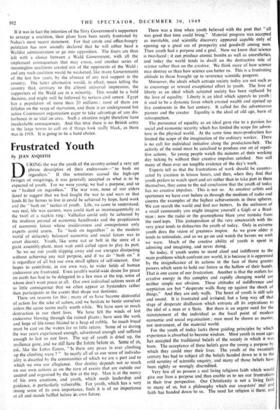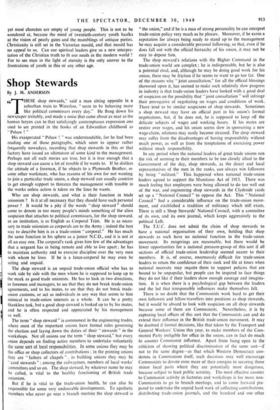Frustrated Youth
li. JI AN ASQUITH
DURING the war the youth of the country.coined a very apt phrase descriptive of their endeavours—" to bash on regardless." If this sometimes caused the high-ups twinges of misgivings, it was generally accepted as what is to be expected of youth. For we were young, we had a purpose, and so we " bashed on regardless." The war won, none of our elders dared to suggest that we had fought the war to end wars or that lands fit for heroes to live in could be achieved by hope, hard work and the " bash on " tactics of youth. Life, we came to understand, was real, life was earnest, wars could start as inconsequentially as the twirl of a napkin ring : Valhallas could only be achieved by the studious perusal of economic handbooks and the propitiation of economic forces whose insidiousness and omnipotence only experts could assess. To " bash on regardless" in the modern world of delicately balanced economic and social forces was to court disaster. Youth, like some nut or bolt in the store of a giant assembly-plant, must wait until called upon to play its part.
So we see our youth slipping away and our energies dissipating without achieving any real purpose, and if we do " bash on " it is regardless of all but our own small sphere of self-interest. Our hopes to contribute, in our own way, to wider fields of human endeavour are frustrated. Even youth's world-wide desire for peace on earth has had to he delegated to a few men at the top, some of whom don't want pence at all. Our own individual actions seem of so little consequence that we often appear as bystanders rather than participants in the events that shape our destinies.
There are reasons for this : many of us have become distrustful of action for the sake of action, and we hesitate to bestir ourselves unless the cause seems really worth while. We have seen so much destruction in our short lives. We have felt the winds of lost endeavour blowing through the ruined places ; have seen the work and hope of life-times blasted to a heap of rubble. So much bread must be cast on the waters for so little return. Some of us during the war years experienced enough, adventured enough and suffered enough to last us our lives. The sap of youth is dried up, the resilience gone, and we still have the future before us. Some of us, ask, like the Lotus Eaters, " Is there any peace in ever climbing up the climbing wave ? " In nearly all of us our sense of individu- ality is dwarfed by the communities of which we are a part and to which we owe our allegiance. Our destiny depends not so much on our own actions as on the turn of events that are outside our control and organised by the few at the top. Man is at the mercy of his own creations, and youth, which needs leadership and guidance, is particularly vulnerable. For youth, which has a very strong sense of its own importance, finds it is of no importance at all and standi baffled before its own future.
There was a time when youth believed with the poet that "all was good that time could bring." Material progress was accepted as inevitable, and scientific discovery appeared capable only of opening up a great era of prosperity and goodwill among men. Then youth had a purpose and a goal. Now we know that science is two-faced ; it can produce atomic bombs as well as anaesthetics, and today the world tends to dwell on the destructive side of science rather than on the creative. We think more of how science may destroy us than how science can better us. This is a frustrating attitude to those brought up to reverence scientific progress.
Moreover, the ideals which actuate society today are not such as to encourage or reward exceptional effort in youth. The love of liberty as an ideal which actuated society has been replaced by the love of equality. Liberty is an ideal which appeals to youth ; it used to be a dynamic force which created wealth and opened up five continents in the last century. It called for the adventurous pioneer and the creator. Equality is the ideal of old age, born of retrospection.
The pursuance of equality as an ideal gave rise to a passion for social and economic security which has limited the scope for adven- ture in the physical world. At the same time mass-production has limited the scope of the imagination of the ordinary worker. There is no call for individual initiative along the production-belt. The activity of the mind must be canalised to produce one set of repeti- tive actions. So young people watch the minutes of their working day ticking by without their creative impulses satisfied. Nor will many of them ever see tangible evidence of the day's work.
Experts tell us that the frustrations of work should be counter- acted by creation in leisure hours, and then, when they find that youth prefers to watch sport and art rather than to take part in them themselves, they come to the sad conclusion that the youth of today has no creative impulses. This is not so. As amateur artists and sportsmen we have ever before us through the medium of radio and cinema the examples of the highest achievements in these spheres. We can search the world and find our betters. In the seclusion of a small community you might imagine yourself a Gigli or a Brad- man ; now the radio or the gramophone blare your mistake from the roof-tops. This juxtaposition of the very amateurish with the very great tends to dishearten the youth of today. Only in extreme youth does the vision of greatness inspire. As we grow older it tends to intimidate, and so we go on and watch the heroes we wish we were. Much of the creative ability of youth is spent in admiring and imagining, and never doing.
So today, if youth seems to stand aloof and indifferent to the main problems which confront our world, it is because it is oppressed by the insignificance of its actions in the face of those greater powers which seem to hold our future in the hollow of their hands. That is one cause of our frustration. Another is that the outlets for creative energy in this complex and rapidly changing world are neither simple nor obvious. These attitudes of indifference and scepticism are but " desperate walls flung up against the shock of things." And they are only walls. The heart of youth is still safe and sound. It is frustrated and irritated, but a long way off that stage of desperate disillusion which entrusts all its aspirations to the idol of a man or a State. But there is an urgent need for the reinstatement of the individual as the focal point of modern economic and social organisation ; man must be shown as master, not instrument, of the material world.
For the youth of today lacks those guiding principles by which experience is absorbed to become wisdom. Most youth in most ages has accepted the traditional beliefs of the society in which it was born. The acceptance of these beliefs gave the young a purpose by which they could steer their lives. The youth of the twentieth century has had to subject all the beliefs handed down to it to the cold scrutiny of scientific enquiry, and many of those beliefs have been rightly or wrongly discredited.
Very few of us possess a real living religious faith which would give our lives a purpose and. thus enable us to see our frustrations in their true perspective. Our Christianity is not a living faith to many of us, but a philosophy which our ancestors' zeal and faith has handed down to us. The need for religion is there. and yet most churches are empty of young people. This is not to be wondered at, because the mind of twentieth-century youth baulks at the vision of pearly gates and the mumblings of antique pieties. Christianity is still set in the Victorian mould, and that mould has no appeal to us. Can our spiritual leaders give us a new interpre- tation of the Christian truth to fit our needs in the modern world ? For to see man in the tight of eternity is the only answer to the frustrations of youth in this or any other age.































 Previous page
Previous page